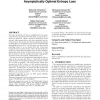Free Online Productivity Tools
i2Speak
i2Symbol
i2OCR
iTex2Img
iWeb2Print
iWeb2Shot
i2Type
iPdf2Split
iPdf2Merge
i2Bopomofo
i2Arabic
i2Style
i2Image
i2PDF
iLatex2Rtf
Sci2ools
STOC
2010
ACM
2010
ACM
Privacy Amplification with Asymptotically Optimal Entropy Loss
We study the problem of "privacy amplification": key agreement between two parties who both know a weak secret w, such as a password. (Such a setting is ubiquitous on the internet, where passwords are the most commonly used security device.) We assume that the key agreement protocol is taking place in the presence of an active computationally unbounded adversary Eve. The adversary may have partial knowledge about w, so we assume only that w has some entropy from Eve's point of view. Thus, the goal of the protocol is to convert this non-uniform secret w into a uniformly distributed string R that is fully secret from Eve. R may then be used as a key for running symmetric cryptographic protocols (such as encryption, authentication, etc.). Because we make no computational assumptions, the entropy in R can come only from w. Thus such a protocol must minimize the entropy loss during its execution, so that R is as long as possible. The best previous results have entropy loss o...
| Added | 30 Aug 2010 |
| Updated | 30 Aug 2010 |
| Type | Conference |
| Year | 2010 |
| Where | STOC |
| Authors | Nishanth Chandran, Bhavana Kanukurthi, Rafail Ostrovsky and Leonid Reyzin |
Comments (0)

